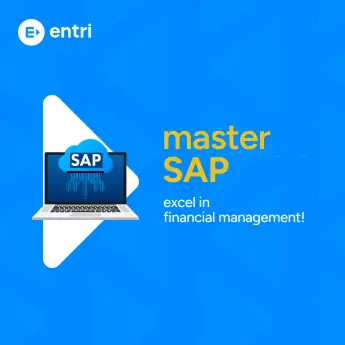Table of Contents
Completing an SAP Global Certification can greatly boost your career. It shows employers that you have real skills in using SAP tools, which many top companies rely on. With this certification, you can explore jobs in areas like finance, HR, supply chain, data, and cloud technology. It also helps you stand out in the job market and gives you the confidence to apply for better opportunities with higher growth and salary potential.
Join Entri’s SAP FICO Training Course today!!
Introduction to SAP Global Certification
SAP Global Certification is a professional credential that proves your knowledge and skills in using SAP software. SAP is one of the world’s leading providers of business technology solutions, used by companies to manage finance, HR, supply chain, sales, data, and many other operations. Because so many global companies depend on SAP systems, certified professionals are always in high demand.
This certification helps individuals show that they understand how to work with SAP tools in real business situations. Whether you are a student, a working professional, or someone planning a career change, SAP Global Certification can make your profile stronger and more trusted by employers. The certification is available in different modules such as SAP FICO, SAP MM, SAP SD, SAP HCM, SAP ABAP, SAP BASIS, and SAP SuccessFactors, allowing you to choose a path that matches your interest and career goals.
One of the best things about SAP Global Certification is that it is recognized worldwide. This means you can find job opportunities not only in your country but also abroad. The learning process is also flexible—SAP offers online training, hands-on practice, and assessments that help you prepare at your own pace.
Why SAP Skills Are in High Demand
SAP skills are becoming more important every year because thousands of companies around the world depend on SAP software to run their daily operations. SAP helps businesses manage everything—from finance and sales to HR, supply chain, and customer service. Since these functions are crucial for any company, they look for professionals who know how to use SAP effectively.
Used by Top Global Companies
Many well-known companies in industries like manufacturing, banking, healthcare, retail, and IT use SAP.
Because of this, they need trained professionals who can handle their SAP systems smoothly. This creates a large number of job openings for people with SAP skills.
Helps Companies Work More Efficiently
SAP software brings all business processes together in one system. This reduces errors, speeds up work, and improves decision-making. Companies know that hiring SAP-trained employees helps them save time and money, which is why they prefer certified professionals.
Strong Demand Across Multiple Job Roles
SAP skills are not limited to one type of job. You can work in finance, HR, supply chain, marketing, analytics, or cloud systems if you know SAP. This flexibility makes SAP a popular choice for students and working professionals.
Global Career Opportunities
SAP certifications are accepted worldwide. This means you can apply for jobs in many countries, not just your local area. Professionals with SAP skills often get opportunities in the USA, Germany, UK, UAE, and many other regions.
High Salary Packages
Because there are fewer trained SAP professionals compared to demand, companies offer attractive salary packages. Jobs like SAP Consultant, SAP Analyst, and SAP Developer are among the highest-paying roles in the IT and business fields.
Growing Need for Digital Transformation
Today, most companies want to move to digital systems. SAP provides modern solutions like SAP S/4HANA, SAP Cloud Platform, and SuccessFactors that help businesses become smarter and faster. To handle these new technologies, companies need skilled SAP experts.
Long-Term Career Growth
SAP keeps updating its products, so professionals who learn SAP have continuous learning opportunities. This helps them stay relevant and grow steadily in their careers.
Master SAP with Expert-Led Courses
Unlock your potential with our comprehensive SAP courses! Learn essential modules like SAP MM (Materials Management), SAP SD (Sales and Distribution), and SAP FICO (Financial Accounting and Controlling) from industry experts.
Know MoreCore Career Paths After SAP Certification
Earning an SAP certification opens the door to many strong and stable career options. Since SAP is used in almost every industry—such as banking, retail, manufacturing, IT, healthcare, and logistics—certified professionals can choose a career path that matches their skills and interests. Below are some of the most popular and rewarding career paths you can follow after completing SAP certification.
1. SAP Functional Consultant
A Functional Consultant works closely with business teams to understand their needs and set up SAP systems accordingly. You choose a module like SAP FICO, SAP MM, SAP SD, SAP HCM, or SAP PP based on your background. Your job is to ensure that SAP supports the company’s business processes smoothly.
- Analyse business requirements
- Configure SAP settings
- Test the system
- Provide training to end-users
This is one of the most in-demand career roles for certified professionals.
2. SAP Technical Consultant
If you enjoy coding or programming, becoming a Technical Consultant is a great choice. These professionals work with SAP ABAP, SAP BASIS, SAP Security, or SAP HANA development.
- Write custom SAP programs
- Build reports, forms, and workflows
- Maintain system performance
- Support upgrades and troubleshooting
Technical consultants are needed in every SAP project and earn high salaries.
3. SAP Project Manager
After gaining some experience, many SAP professionals move into Project Management. A Project Manager oversees SAP implementation projects, manages teams, and ensures the project is completed on time.
- Plan and execute SAP projects
- Coordinate with consultants and clients
- Manage timelines and budgets
- Ensure smooth system go-live
This role requires good leadership and communication skills.
4. SAP Analyst
An SAP Analyst works with data, system reports, and process improvements. You become a bridge between technical teams and business teams.
- Analyse business problems
- Suggest SAP-based solutions
- Generate reports
- Support daily system operations
This role suits people who enjoy solving problems and working with data.
5. SAP End-User
An End-User uses SAP for daily tasks within departments like finance, HR, procurement, or sales. Many companies prefer hiring certified end-users because they already understand the system.
- Perform everyday SAP transactions
- Maintain records
- Generate reports
- Support team tasks using SAP
This is a good starting point for beginners or freshers.
6. SAP Trainer or Instructor
If you enjoy teaching, you can become an SAP Trainer. Organizations, training institutes, and corporate teams often hire certified professionals to train new learners.
- Conduct SAP workshops
- Teach module concepts
- Guide students through practical exercises
- Prepare training materials
This is a growing field, especially with online learning.
7. SAP Data Consultant
Data is becoming very important for companies, and SAP plays a big role in managing it. SAP Data Consultants work with tools like SAP BW, SAP HANA, and SAP Analytics Cloud.
- Manage large data sets
- Create dashboards and reports
- Help companies make data-driven decisions
This is a future-proof and high-growth career path.
Job Roles Based on Different SAP Modules
SAP offers a wide range of modules, and each one focuses on a different part of business operations. After completing an SAP certification in any specific module, you can explore job roles that match your skills and interests. Below is a clear breakdown of popular SAP modules and the job roles connected to each one.
SAP FICO (Finance & Controlling)
SAP FICO is one of the most in-demand modules. It is ideal for people with commerce, finance, or accounting backgrounds.
Job Roles:
- SAP FICO Consultant: Supports financial processes, prepares financial reports, and configures finance settings.
- Financial Analyst: Works with budgeting, forecasting, and financial planning using SAP tools.
- Accounts Executive: Handles daily transactions, invoices, payments, and reports in SAP.
SAP MM (Materials Management)
This module focuses on procurement, inventory management, and vendor handling.
Job Roles:
- SAP MM Consultant: Configures purchasing and inventory workflows.
- Procurement Specialist: Manages purchasing, vendor negotiation, and purchase orders.
- Inventory Controller: Ensures materials availability and updates stock records.
SAP SD (Sales & Distribution)
This module is ideal for those interested in sales, order management, and customer service.
Job Roles:
- SAP SD Consultant: Handles order processing, pricing, billing, and shipping configurations.
- Sales Coordinator: Manages sales orders, quotations, and customer communication.
- Customer Service Executive: Supports clients with order-related queries using SAP.
SAP HCM / SuccessFactors (Human Capital Management)
This module is perfect for HR professionals or those interested in people management.
Job Roles:
- SAP HCM Consultant: Configures HR processes like payroll, attendance, and recruitment.
- HR Executive: Manages employee data, onboarding, and payroll using SAP.
- SAP SuccessFactors Consultant: Works on cloud-based HR solutions.
SAP PP (Production Planning)
Ideal for manufacturing and production-related fields.
Job Roles:
- SAP PP Consultant: Plans production, manages capacity, and monitors manufacturing activities.
- Production Planner: Schedules production tasks and ensures smooth operations.
- Plant Manager Support Executive: Assists with SAP-based production reports.
SAP ABAP (Technical Programming)
Best for those who like coding and technical development.
Job Roles:
- SAP ABAP Developer: Creates custom programs, reports, and enhancements.
- Technical Consultant: Supports system integrations and custom workflows.
- System Analyst: Bridges technical requirements with business needs.
SAP BASIS / HANA Administration
This module suits IT and system administration professionals.
Job Roles:
- SAP BASIS Consultant: Manages system installations, upgrades, and performance.
- SAP HANA Administrator: Handles database performance and system optimization.
- IT Support Engineer: Provides system-level SAP support.
Industries Hiring SAP-Certified Professionals
SAP is used by thousands of companies worldwide, which is why SAP-certified professionals are in high demand across many industries. Whether a business deals with finance, manufacturing, retail, or healthcare, SAP helps them manage their operations smoothly. Below are the major industries that actively hire SAP experts, along with simple descriptions of what they do and why they need SAP skills.
1. Information Technology (IT) and Consulting
IT and consulting companies are some of the largest employers of SAP professionals. They help other businesses implement SAP systems, upgrade them, or solve technical issues.
- For SAP implementation projects
- For technical support, customization, and maintenance
- For training and consulting services
Companies like TCS, Infosys, Wipro, Accenture, Capgemini, and Deloitte hire heavily in SAP roles.
2. Manufacturing and Engineering
Manufacturing companies depend on SAP to handle production planning, inventory, supply chain, and quality control.
- To manage raw materials and stock
- To optimize production schedules
- To track orders, shipments, and factory performance
Industries include automobile, electronics, machinery, and heavy equipment manufacturing.
3. Banking, Finance, and Insurance
Banks and financial institutions use SAP for managing accounts, risk, compliance, and financial reporting.
- For SAP FICO implementation
- For financial data analysis
- For improving internal financial workflows
Companies like HDFC Bank, ICICI Bank, HSBC, and insurance companies use SAP widely.
4. Retail and E-Commerce
Retailers and e-commerce businesses need SAP to handle large volumes of products, orders, and customer data.
- To manage inventory and warehouses
- To track sales, offers, and customer behavior
- To streamline the order-to-delivery process
Popular brands like Walmart, Amazon, Starbucks, and Adidas use SAP systems.
5. Healthcare and Pharmaceuticals
Hospitals and pharma companies use SAP to manage patient data, supply chains, laboratories, and compliance.
- For digital record management
- For inventory and medicine tracking
- For regulatory and safety compliance
Companies like Johnson & Johnson, Pfizer, and many hospitals rely on SAP.
6. Logistics and Transportation
This industry relies heavily on SAP to manage shipments, fleets, warehousing, and global trade.
- To track goods in real time
- To manage warehouses and freight
- To improve transportation planning
Logistics companies like DHL, FedEx, and Maersk use SAP solutions.
7. Energy, Oil & Gas, and Utilities
Energy companies manage complex operations like mining, drilling, power generation, and distribution using SAP.
- For asset management
- For workforce planning
- For safety and compliance monitoring
Companies like Shell, BP, Reliance, and ONGC use SAP widely.
8. Telecom
Telecom companies use SAP to manage customers, billing, networks, and service requests.
- For CRM and billing systems
- For network planning and support
- For large-scale data management
Companies like Vodafone, Airtel, and Jio work with SAP-based solutions.
Master SAP with Expert-Led Courses
Unlock your potential with our comprehensive SAP courses! Learn essential modules like SAP MM (Materials Management), SAP SD (Sales and Distribution), and SAP FICO (Financial Accounting and Controlling) from industry experts.
Know MoreCareer Opportunities in SAP Consulting Firms
SAP consulting firms play a major role in helping businesses implement, manage, and upgrade their SAP systems. These firms guide companies through every step of their SAP journey—from planning and customization to training and support. Because of this, there are many exciting career opportunities for SAP-certified professionals within consulting organizations.
Working in an SAP consulting firm not only gives you exposure to different clients and industries but also helps you grow your skills faster. You get to work with real business challenges, modern technologies, and large-scale projects. Below are the major career opportunities you can explore in SAP consulting firms.
1. SAP Functional Consultant
This is one of the most popular roles in consulting firms.
A Functional Consultant works on specific SAP modules like FICO, MM, SD, HCM, PP, or SuccessFactors.
What you do:
- Understand client requirements
- Configure the SAP system based on business needs
- Test new features and workflows
- Train employees on how to use SAP
This role suits people with business or domain knowledge.
2. SAP Technical Consultant
Technical Consultants focus on coding, system development, and SAP integrations.
They work with technologies like ABAP, SAP UI5, BASIS, and HANA.
What you do:
- Develop custom programs and reports
- Fix technical issues
- Integrate SAP with other systems
- Improve system performance
This role is ideal for those who enjoy coding and technical problem-solving.
3. SAP Implementation Consultant
These consultants handle end-to-end SAP implementation projects.
They manage timelines, coordinate with various teams, and ensure the project goes live smoothly.
What you do:
- Plan project stages
- Work with functional and technical teams
- Monitor system testing
- Support the final go-live process
This role requires strong coordination and communication skills.
4. SAP Support Consultant
After the system is live, companies need ongoing support.
Support Consultants help solve day-to-day issues and improve system performance.
What you do:
- Troubleshoot errors
- Handle tickets and user queries
- Support system updates
- Provide small enhancements to existing processes
This is a great role for beginners or freshers entering the SAP field.
5. SAP Project Manager
After gaining experience, many SAP professionals move into project management roles.
Project Managers handle budgets, timelines, team coordination, and client communication.
What you do:
- Lead SAP projects
- Manage teams of consultants
- Ensure timely delivery
- Communicate with clients regularly
This role offers excellent leadership opportunities.
6. SAP Business Analyst
Business Analysts connect the technical team with the business team.
They focus on understanding business processes and suggesting SAP-based improvements.
What you do:
- Document business requirements
- Analyse workflow problems
- Suggest SAP solutions
- Support testing and implementation
This role suits people who enjoy analysis and communication.
7. SAP Trainer or Instructor
Consulting firms often conduct workshops for clients.
Certified professionals can work as trainers to teach SAP concepts and tools.
What you do:
- Prepare training materials
- Conduct online or in-person sessions
- Guide users on new SAP features
- Support employees during system changes
Global Opportunities for SAP Professionals
SAP is used by companies all over the world, which means SAP-certified professionals have access to global career opportunities. Since SAP is a trusted system for managing finance, HR, supply chain, sales, manufacturing, and data, organizations in many countries look for skilled experts who can help them run their business smoothly. This creates a strong international demand for SAP talent.
1. Strong International Demand
Countries with advanced industries—such as the USA, Germany, Canada, UK, Australia, Singapore, and UAE—depend heavily on SAP systems. These countries need skilled professionals who can manage large operations and support their digital transformation.
This high demand makes it easier for skilled SAP professionals to find job openings abroad.
2. Job Opportunities Through Global Consulting Companies
International consulting firms like Accenture, IBM, Deloitte, Capgemini, and PwC hire SAP experts for projects around the world.
Many professionals start working from their home country and later travel abroad for client assignments.
Working with such companies gives you:
- Exposure to international clients
- Opportunities to work in multiple countries
- Experience with global business processes
This is one of the most common ways SAP consultants gain worldwide experience.
3. Rising Remote and Work-From-Home SAP Jobs
With the growth of cloud-based SAP tools, many companies hire consultants remotely.
This means you can work for international clients without relocating.
Benefits include:
- Earning higher income
- Flexible work hours
- Experience with global teams
Remote SAP roles are increasing every year, especially in modules like SuccessFactors, Ariba, and S/4HANA.
4. Visa Sponsorships for Experienced Professionals
Once you gain a few years of real project experience, many companies are willing to sponsor visas for roles abroad.
Countries with high demand for SAP talent actively recruit skilled consultants for onsite positions.
This makes SAP a strong career option for those who want to live and work overseas.
5. Worldwide Salary Advantage
SAP professionals are paid well globally because companies need experts who understand both business and technology.
Roles such as SAP Consultant, SAP Developer, and SAP Analyst often come with high salaries and strong career growth.
Freelancing and Remote SAP Career Options
Today, many companies prefer hiring SAP professionals who can work remotely or on a freelance basis. This trend has grown quickly because businesses are moving to cloud-based SAP systems and need experts who can support them from anywhere. For professionals, this creates flexible, high-paying opportunities without the need to relocate.
1. Growing Demand for Remote SAP Roles
Many organizations now manage their SAP systems online, which makes remote work easier.
As a remote SAP professional, you can help companies solve issues, configure systems, or provide support right from your home.
Why it’s popular:
- No need to travel
- Work with global teams
- Flexible working hours
- Better work–life balance
Modules like SAP SuccessFactors, SAP Ariba, SAP S/4HANA Cloud, and SAP Analytics Cloud have the highest remote job demand.
2. Freelance SAP Consulting
Freelancing is a great option for experienced SAP consultants. Instead of working full-time for one company, you can take up different projects based on your skills and availability.
What freelancers usually do:
- Implement SAP modules
- Fix technical issues
- Develop custom reports or programs
- Train employees
- Provide monthly support
You can work for multiple clients and choose projects that match your strengths.
3. Higher Earning Potential
Freelancers and remote consultants often earn more because they are paid per project or per hour.
International clients especially offer higher rates, allowing you to earn in foreign currencies while working from your home country.
4. Work for Global Clients Without Relocating
Remote SAP roles allow you to work with companies in the USA, Europe, the Middle East, and Asia—without applying for visas or moving abroad.
This gives you global exposure and experience in international business processes.
5. Flexibility to Choose Your Work Style
Whether you prefer long-term projects or short-term tasks, freelance SAP work offers freedom.
You can:
- Work part-time or full-time
- Take breaks between projects
- Build your own schedule
- Select industries you enjoy
This is especially helpful for parents, students, or working professionals looking for extra income.
Salary Expectations After SAP Certification
Getting an SAP certification can significantly improve your salary potential. Companies value SAP professionals because they help manage key business functions like finance, HR, supply chain, sales, and data. As a result, certified candidates often receive higher salaries compared to non-certified professionals. Your exact salary depends on your module, experience, location, and the industry you work in. Below is a simple breakdown to help you understand what to expect.
1. Salary for Freshers
If you are new to SAP with little or no experience, companies may hire you as an SAP associate, trainee, or support consultant.
Average salary range:
- ₹3.5 LPA to ₹6 LPA in India
- Higher ranges apply in countries like the USA, Canada, UAE, UK, and Europe
Freshers working in SAP end-user roles may earn slightly less, while those in consulting firms may earn more.
2. Salary After 1–3 Years of Experience
Once you gain hands-on experience, your salary increases quickly.
Companies look for consultants who can handle configuration, testing, and support without much supervision.
Average salary range:
- ₹6 LPA to ₹10 LPA in India
- Considerably higher internationally
At this stage, your module (FICO, MM, SD, HCM, ABAP, etc.) also affects your salary.
3. Salary for Mid-Level SAP Consultants (3–7 Years)
Professionals with a few years of solid experience can expect strong salary growth.
With good project exposure, you may also get opportunities to lead small teams.
Average salary range:
- ₹10 LPA to ₹18 LPA in India
- Much higher for overseas placements
Specialized modules like SAP SuccessFactors, Ariba, SAP PP, SAP Basis, and S/4HANA often pay more.
4. Salary for Senior SAP Consultants (7+ Years)
Senior consultants, architects, and lead roles earn significantly more because they handle complex implementations and guide teams.
Average salary range:
- ₹18 LPA to ₹30+ LPA in India
- High-paying global packages in countries like the USA, UK, Germany, Australia, and UAE
Senior professionals often move into roles such as SAP Project Manager, SAP Solution Architect, or SAP Lead Consultant.
5. Additional Earning Opportunities
With SAP skills, you can also earn more through:
- Freelancing projects
- Remote international work
- Corporate training
- Consulting-based assignments
These options can help you increase your income without changing your full-time job.
How to Build a Strong SAP Career Profile
Building a strong SAP career profile is important if you want to stand out in the job market and get better opportunities. SAP is a highly competitive field, so you need the right mix of skills, certifications, experience, and professional presentation. With the right approach, you can create a profile that attracts recruiters and shows that you are ready for real SAP projects.
1. Choose the Right SAP Module
Your SAP journey starts with selecting a module that matches your background and interests.
For example:
- Finance → SAP FICO
- HR → SAP HCM / SuccessFactors
- Supply Chain → SAP MM or SAP SD
- IT/Programming → SAP ABAP or SAP BASIS
Choosing the right module helps you grow faster and makes your profile more focused.
2. Get SAP Training and Certification
Completing SAP Global Certification adds strong credibility to your profile.
It shows that you understand the system and can work with real business processes.
Tips:
- Take training from trusted institutes
- Practice with real-time scenarios
- Prepare well for the certification exam
Certification is a great way to get more attention from recruiters.
3. Build Hands-On Experience
Practical experience matters a lot in SAP. Even if you are a fresher, you can start building experience through:
- Internship programs
- Live project training
- Practice on SAP sandbox systems
- Volunteer or small freelance tasks
Hands-on practice improves your confidence and helps you understand how SAP works in real companies.
4. Learn Basic Business Processes
SAP is not only about technology; it also involves understanding how businesses operate.
Learning business workflows such as procurement, finance, inventory, HR, or sales makes you a better consultant.
This helps you solve client problems more effectively.
5. Add Technical Skills (Optional but Useful)
Even functional consultants can benefit from basic technical skills like:
- SQL
- Excel
- Reporting tools
- Basic ABAP knowledge
- SAP Fiori and SAP HANA concepts
These skills make your profile stronger and more versatile.
6. Create a Professional Resume and LinkedIn Profile
Your resume should be clean, simple, and focused on SAP skills.
Highlight:
- SAP module knowledge
- Certification details
- Hands-on practice experience
- Relevant business or domain skills
A good LinkedIn profile also helps recruiters find you easily.
7. Stay Updated with SAP Trends
SAP keeps improving its technology, especially with S/4HANA and cloud solutions.
Stay updated by learning new tools, attending webinars, and reading SAP blogs.
Being updated shows that you are serious about your SAP career.
8. Join SAP Communities and Forums
Platforms like SAP Community, LinkedIn groups, and tech forums help you:
- Learn from other professionals
- Solve doubts
- Understand industry trends
- Build networking connections
Networking can open the door to new job opportunities.
Join Entri’s SAP FICO Training Course today!!
Conclusion: Future Scope of SAP-Certified Careers
The future for SAP-certified professionals looks very bright. As businesses continue to rely on digital systems to manage their operations, the need for skilled SAP experts will only grow. SAP is constantly updating its technologies, such as SAP S/4HANA, cloud solutions, automation tools, and analytics platforms. This means that professionals who stay updated and continue learning will always find strong career opportunities.
Whether you want to work in IT, finance, supply chain, HR, or data management, SAP skills can help you build a stable and rewarding career. These certifications not only improve your technical knowledge but also increase your chances of getting better jobs, higher salaries, and opportunities in global companies.
| Related Links | |
| Which SAP Module Is Best for Freshers | Top Companies Using SAP Software in India |
| Which SAP Module is Best for Logistics | Top SAP Interview Questions and Answers |
Master SAP with Expert-Led Courses
Unlock your potential with our comprehensive SAP courses! Learn essential modules like SAP MM (Materials Management), SAP SD (Sales and Distribution), and SAP FICO (Financial Accounting and Controlling) from industry experts.
Know MoreFrequently Asked Questions
What is SAP Global Certification and why is it important?
SAP Global Certification is an official credential that confirms your knowledge of SAP tools and business processes. It is globally recognized and helps employers trust your skills. This certification boosts your profile, increases job opportunities, and helps you stand out in a competitive job market.
What job roles can I get after completing SAP certification?
You can work in many roles depending on your SAP module. Common roles include SAP Consultant, SAP Functional Analyst, SAP Technical Developer, SAP Support Specialist, SAP Project Manager, and SAP Data Analyst. Each role offers good growth opportunities and is in demand across industries.
Which industries hire SAP-certified professionals?
SAP-certified experts are needed in almost every major industry. Popular industries include IT, manufacturing, retail, banking, healthcare, logistics, energy, and e-commerce. Since SAP systems help companies manage business operations, the demand exists in both large companies and growing enterprises.
How much salary can I expect after SAP certification?
Salary depends on your module, experience, and location. Freshers usually earn between ₹3.5–6 LPA in India, while experienced SAP consultants can earn ₹8–20+ LPA. In international markets, salaries are even higher, especially for SAP S/4HANA and cloud-based roles.
Do I need programming skills to pursue SAP?
Programming is not required for most SAP functional modules like SAP FICO, SAP SD, SAP MM, and SAP HCM. However, if you choose technical modules such as SAP ABAP, SAP BASIS, or SAP HANA Development, then basic programming knowledge is helpful.
Can SAP certification help me get jobs abroad?
Yes. SAP is used by companies all over the world, so certified professionals have strong opportunities in countries like Germany, the UAE, the USA, the UK, Australia, and Singapore. Having international certifications increases your chances of working with global companies or relocating in the future.
Is freelancing possible after SAP certification?
Absolutely. Many SAP consultants work remotely or on contract projects. As a freelancer, you can support global clients, handle system configurations, offer troubleshooting help, or work on short-term SAP implementations. This gives you flexibility, better income, and the freedom to choose your projects.












